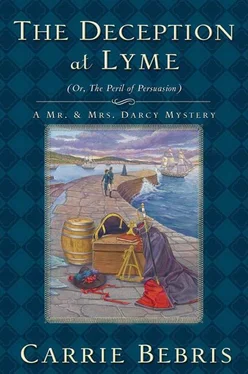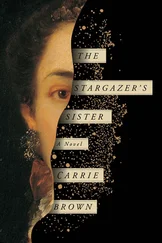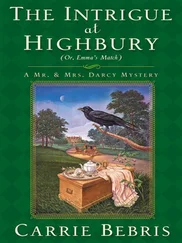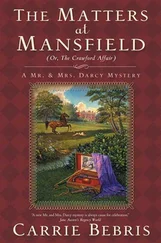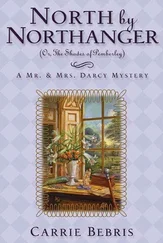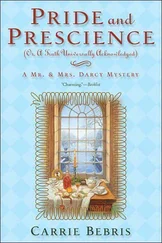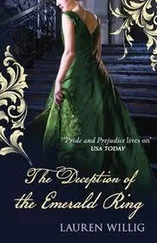“Meanwhile, the death of the child’s mother apparently means little to either Sir Walter or Mr. Elliot.” Elizabeth sipped her lemonade. It was tepid, which only dropped Sir Walter further in her esteem.
“I think I am glad not to have met this Mr. Elliot,” Georgiana said. “It sounds as if he would never have borne the title of ‘sir’ as honorably as another baronet in this room.”
“Sir Laurence is here?” Elizabeth had not spied him among the guests, but doubted Georgiana meant Sir Walter or Sir Basil.
“Yes, with his sister. They are over there, just behind that gentleman wearing the mourning band.” She squinted. “Why, I believe that is the man who brushed past me on the Cobb the morning of Lady Elliot’s accident.”
Elizabeth and Darcy followed Georgiana’s gaze. The only person near Sir Laurence who wore an armband was Mr. Elliot.
Darcy’s countenance reflected puzzlement. “When did Mr. Elliot pass us that morning? I did not meet him until after you had returned to our lodgings with Lily-Anne.”
“Is that man Mr. Elliot? I saw him before the accident.”
Upon this announcement, all of Elizabeth’s doubts about the nature of Lady Elliot’s fall resurfaced. “Georgiana, precisely where did you see Mr. Elliot on the Cobb, and what was he doing?”
“He was on the upper wall. We had just arrived and ascended the steps—you and my brother were distracted by Lily-Anne. He walked right past us, so absorbed by his own thoughts that he would have bumped into me had I not stepped aside. Even then, I do not think he noticed me.”
Sir Laurence and Miss Ashford, having spotted Georgiana, now approached. “Do you mind if I leave you for a while?” Georgiana asked Elizabeth and Darcy.
“Not at all,” Elizabeth said. “Doubtless you would rather discuss any number of subjects with a handsome baronet than Mr. Elliot’s presence on the Cobb with me.”
Georgiana’s smile held a hint of coyness. “Perhaps.” She happily went to meet her friends, leaving Darcy and Elizabeth to themselves.
“So,” Elizabeth said in a voice meant for only Darcy to hear, “Mr. Elliot was on the Cobb near the time of Lady Elliot’s accident—an accident that could well have taken Alfred’s life in addition to his mother’s.” She met Darcy’s gaze and knew she did not need to state the rest aloud. And that, if it had, would have secured Mr. Elliot the inheritance he has now lost. “When you met him, did he say anything to suggest he had been on the Cobb earlier that day?”
“On the contrary, he gave every indication that he had not, although one of the dockworkers thought he had seen him talking to Lady Elliot that morning. Georgiana’s account, however, suggests that he was leaving the seawall when he passed my sister—which was before we saw Lady Elliot still very much alive.”
“Then why should Mr. Elliot prevaricate about his presence on the Cobb before the accident? His conduct that day leaves much to be explained.”
Elizabeth studied Mr. Elliot. He had been very eager to take possession of Mrs. Clay’s baby after his birth—but what had been his feelings toward the child before it? He had not been attached enough to mother or child to marry Mrs. Clay and legitimize their relationship, as Sir Walter had done.
“The dockworker said Mr. Elliot and Mrs. Clay argued,” Elizabeth continued. “I wonder whether she told him she had married Sir Walter.”
“He appeared surprised by the news when we told him at the Harvilles’ house.”
“Yes— appeared. What if he already knew? What if the subject occupying his thoughts when he brushed past Georgiana was the revelation that Mrs. Clay was now Lady Elliot, and the child she carried was now Sir Walter’s heir? Mrs. Clay’s final words were ‘Elliot’ and ‘pushed.’ It is possible—perhaps not probable, but possible—that after Georgiana saw him, he circled back on the lower Cobb, ascended Granny’s Teeth, and finished the argument in a manner meant to ensure the child did not live to usurp Mr. Elliot’s claim to the baronetcy.”
It was almost incomprehensible to Elizabeth that anybody could be so cold-blooded as to deliberately take the life of a child who stood in the way of succession. Yet history had proven otherwise; one had only to recall the two princes in the Tower to understand that childhood and innocence offer no protection from adult greed and ambition. And to realize that, though Alfred survived his mother’s fall, he might not yet survive the circumstances of his birth. So long as he lived, he was the sole obstacle—presently an utterly helpless obstacle—to an inheritance somebody else had been anticipating for three decades.
“We cannot level accusations against a respectable member of society based solely upon conjecture we have drawn from the utterances of a barely coherent woman on her deathbed and a barely articulate child at play—however pitiable the former, and however intelligent we might believe our daughter to be,” Darcy said. “I am more disturbed by his potential motives for trying to seize custody of Alfred after the accident than I am convinced that Mr. Elliot caused it. If he did circle back on the lower Cobb, as you suggest, would not someone have seen him?”
Elizabeth glanced toward the main doors of the room. A sedan chair had just arrived; Sir Walter was directing its bearers to deposit its occupant in an out-of-the-way corner.
“Perhaps someone did.”
“I have known a good deal of the profession; and besides their liberality, they are so neat and careful in all their ways!”
—
Mrs. Clay, speaking of naval officers, Persuasion
Much to her father’s obvious displeasure, Mrs. Wentworth abandoned her receiving line duties, transferring Alfred to her younger sister and following the sedan chair to the unpopulated corner to which Sir Walter had sent it. As Mrs. Wentworth assisted its emerging passenger, Elizabeth turned to Darcy.
“I am going to retrieve more lemonade.”
“We have not yet finished these,” Darcy said, “and the quality hardly inspires a yearning for more.”
“It is not for us. It is for Mrs. Smith.”
“I see.” He, too, looked toward the corner. The sedan chair and its bearers had departed; Mrs. Wentworth was now helping Mrs. Smith toward a seat beside a large, round table. “Would you like me to come with you?”
Elizabeth considered a moment. Women talk very differently amongst themselves than when gentlemen are present, and she had already established a rapport with the widow. It might be easier to guide the conversation toward the accident without Darcy’s company.
“I will introduce you, then perhaps you could go seek the Harvilles’ conversation.”
She fetched two glasses of lemonade and led Darcy to the ladies. Mrs. Smith greeted Elizabeth’s arrival with the delight of encountering an old friend. “Mrs. Darcy! What a pleasure to see you here! I told Anne about the kindness you and Miss Darcy rendered me.”
“It is a pleasure to see you again, too.” Elizabeth introduced Darcy, whose acquaintance Mrs. Smith entered with equal happiness.
Elizabeth set the lemonade on the table and helped Mrs. Wentworth settle Mrs. Smith into her seat. Darcy, after determining his assistance was not needed, and exchanging a few pleasantries with Mrs. Smith on the subject of the fineness of the day and the beauty of Lyme, excused himself on the pretext of checking on his sister.
Elizabeth chose a chair beside Mrs. Smith. Mrs. Wentworth took another, but perched on its edge in the manner of someone not entirely committed to remaining seated. Her attention was divided between their party and the receiving line, where Sir Walter was casting glances at her that proclaimed his desire for her to return to her greeting duties. That he was neglecting his own obligations as a host by ignoring Mrs. Smith did not seem to trouble him.
Читать дальше
